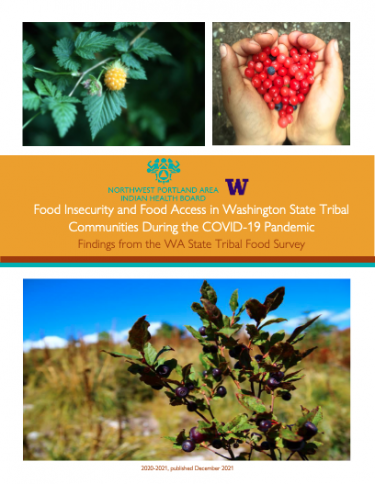WA State Tribal Food Survey Report – Food Insecurity and Food Access in Washington State Tribal Communities During the COVID-19 Pandemic
Published December 7, 2021, this report shares findings from the WA State Tribal Food Survey, a joint project between the Northwest Tribal Epidemiology Center (NWTEC), the University of Washington School of Public Health (UWSPH), and Tacoma Community College (TCC) that aimed to better understand the impacts of the COVID-19 pandemic on the wellbeing, food security, and access to traditional foods of WA state tribal communities. The survey ran March/April 2021 and was funded by a UW Population Health Equity Research Grant.

Key Findings
The WA State Tribal Food Survey (WATRIBAL) received 196 responses from WA state residents identifying as a member or descendant of a tribe. 67% of households responding were found to be food insecure. Use of food assistance, which was disproportionately high within tribal communities prior to the pandemic, rose substantially over the course of COVID-19. Respondents identified major barriers to accessing and using traditional foods, with about half the sample reporting a decrease in their use of traditional foods. Top barriers to engaging with traditional foods included COVID-19 health restrictions, and pandemic-related disruptions to many channels of traditional food procurement and distribution.
WATRIBAL participants reported faith in the leadership of tribal officials, elders, healthcare providers, and community groups responding to COVID-19, among others. Respondents named community support, or people helping one another out, as a top positive outcome of the pandemic. Many of those surveyed expressed great interest in having and expanding traditional foods programming.
Explore More: Find all publications related to this study on the project page.
Materials
Publication Date: December 7, 2021
Author(s): The WATRIBAL project is a joint effort between the Northwest Tribal Epidemiology Center (NWTEC), a part of the Northwest Portland Area Indian Health Board (NPAIHB), the University of Washington School of Public Health (UWSPH), and Tacoma Community College (TCC). The team is comprised of Victoria Warren-Mears, Director, NWTEC; Nora Frank-Buckner, Food Sovereignty Initiatives Director, NPAIHB; Jenine Dankovchik, Program Evaluation Specialist, NPAIHB; Jennifer J. Otten, Food Systems Director and Associate Professor, Nutritional Sciences and Environmental and Occupational Health Sciences (DEOHS) at UW School of Public Health (UWSPH); Adam Drewnowski, Director, Center for Public Health Nutrition and Professor, Epidemiology at UWSPH; Chelsea M. Rose, Research Scientist, Epidemiology at UWSPH; James Buszkiewicz, Research Scientist, Epidemiology at UWSPH; Alan Ismach, Research Coordinator, DEOHS at UWSPH, Esther Nguyen, Research Coordinator at UWSPH; and Brinda Sivaramakrishnan, Professor, Community Health at TCC.
Resource Type(s): Reports
Research Area(s): Food Access, Food Systems & Nutrition, Social Determinants of Health